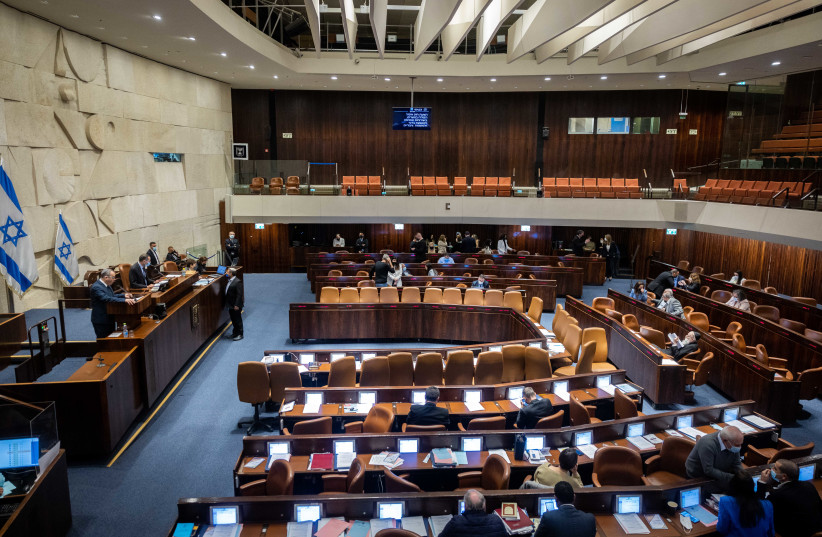The Knesset will disperse by Wednesday at midnight, as coalition and opposition representatives reached an agreement late Monday night after a long day of political haggling. The details of the agreement remain to be seen.
The Knesset Committee late on Monday unanimously passed the Knesset dispersal bill in its first reading. A few moments later, the bill also passed in the Knesset plenum.
Negotiations between the coalition and opposition dragged on throughout the day, as the sides negotiated which bills the two sides would agree to pass before the Knesset disbanded. They eventually decided to pass two laws that they both agreed on, but at press time had not reached an agreement on the rest of the over 20 bills that are ready for their final reading.
The first bill that passed doubled the budget for the Disabilities Administration, which is part of the Labor, Social Affairs and Social Services Ministry. The second was a bill to compensate businesses that suffered financially during the Omicron corona wave.
In a rare show of unity, coalition and opposition MKs hugged and congratulated each other after the bill passed.
The opposition then began a filibuster in order to block the coalition from bringing forward any other law until the two sides reached a final agreement.

The opposition lost two no-confidence votes earlier in the afternoon, signaling its current inability to form an alternate government since such a government would have needed to be announced as part of the no-confidence vote.
The sides could also not agree on the date of the election. The haredi parties and Religious Zionism want the election to be on the earliest possible date, October 25, since yeshivot from both sectors will be on fall holiday vacation and will be able to mobilize on Election Day. The yeshivot begin their winter session on October 26.
The coalition, however, wants it on November 1. The Likud originally opposed this date since it falls during the week that Israelis will be commemorating the assassination of former prime minister Yitzhak Rabin, and it did not want the election to be held during what MK Yoav Kish (Likud) called the “Rabin parade.” The Likud later recanted.
The sides eventually agreed to decide the issue by holding a vote on the plenum floor. That vote was also not held by press time.
Knesset Committee head MK Nir Orbach (Yamina) had originally scheduled a meeting to begin the legislative process for the Knesset dispersal bill at 9:30 a.m., but it was delayed repeatedly and finally convened at 6:30 p.m., only to be postponed once again.
Many MKs participated in the negotiations throughout the day, including coalition whip MK Boaz Toporovsky (Yesh Atid), MK Eitan Ginzburg (Blue and White) and Likud MKs David Bitan and Yoav Kish and David Bitan.
Knives out as campaigns begins
Knesset party leaders took advantage of their weekly news conferences before their Monday faction meetings to take jabs at each other, providing a glimpse into their campaign strategy and platform ahead of the upcoming election.
Yisrael Beytenu head and Finance Minister Avigdor Liberman attacked “those who chose an election,” blaming them for what he said was a NIS 2.4 billion waste of public funds. He expressed his hope that Israeli voters would not forgive them on Election Day.
Liberman did not say whom he was referring to, but Prime Minister Naftali Bennett and Alternate Prime Minister Yair Lapid were the ones who officially made the decision to disband the Knesset.
Liberman stressed his preference for a Zionist government from “Meretz to Yamina,” and said that he would not join a government with the haredi parties. He prided himself for incentivizing haredi schools to include ‘core’ curriculums. Liberman accused the haredi parties of trying to keep their constituents poor, and argued that the core curriculum is the first step in changing this.
Meretz Party leader and Health Minister Nitzan Horowitz took a jab at Bennett, saying Bennett’s party, Yamina, was largely responsible for the coalition instability. Three out of Yamina’s seven MKs ceased voting with the coalition during Bennett’s tenure.
Horowitz focused on his party’s success in passing a directive that will change the abortion process in Israel. He argued that the current process was outdated and included invasive questions. The decision was to update the questions as well as enable women to complete the process remotely without having to appear before a committee.
Both Horowitz and Labor leader and Transportation Minister Merav Michaeli argued that the process to cancel the constitutional right to abortions began with former US President Donald Trump appointing three conservative judges. This is a possible scenario in Israel as well, they argued, and the Left must act so as not to allow it.
Religious Zionist Party head MK Bezalel Smotrich blamed the coalition for irresponsibly taking the country to an election. He vowed to do all he could to postpone the Knesset’s dispersal so as to allow an alternate government to form.
